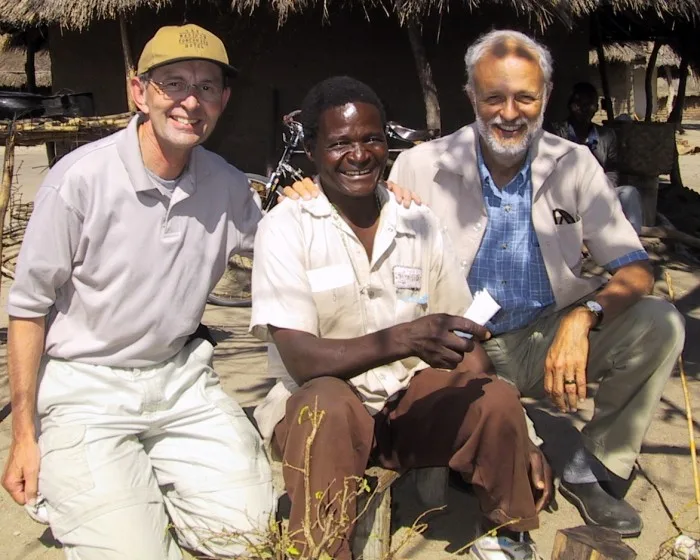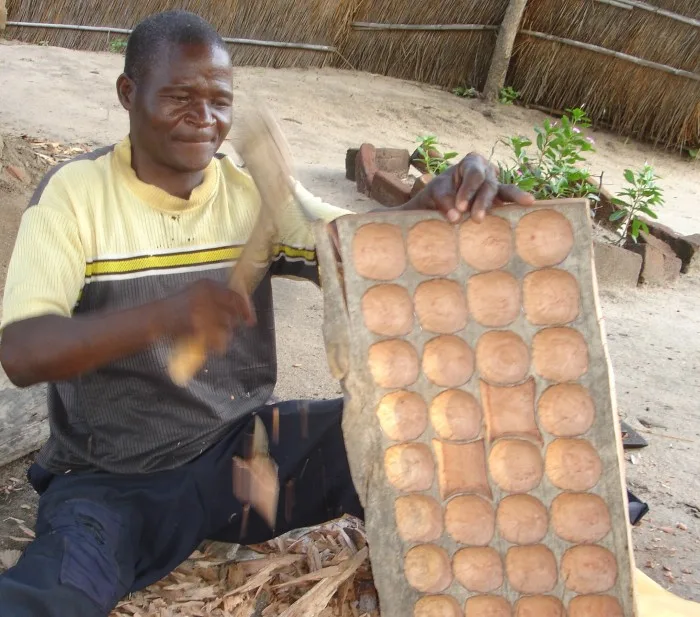From the Archives – An Extraordinary Man
The MCV Annual Newsletter 2014 is off to the printer and should be arriving in mail boxes around Thanksgiving. We profile the village of Chipoka 1 in this year’s newsletter, reminding us of Nicki Kennedy’s excellent profile of one of Chipoka 1’s volunteers in our 2010 newsletter. In case you missed it, or would just enjoy reading it again, we’ve dug it out from our archives below:
An Extroardinary Man
By Nicki Kennedy

Stanford with board members Don Gray and Tom Nighswander
By American standards Stanford Mangoni is a small man. He’s shorter than me (I’m 5’6”) by several inches and walks with a pronounced limp that makes him seem even shorter than he is. He wears his hair shaved closely to his skin, both on his chin and on his pate. It’s difficult to tell for sure how old Stanford is. His face is fairly smooth, but his eyes tell you with a sparkle in their depths, that he’s been around for a while. If you were to see Stanford walking down the road, you would probably take no note of him; just a lame old man trundling along the way. If you were to see him walking down the road, you would have no idea how extraordinary a man he truly is.
Stanford is a village volunteer at MCV. As we sit together at my table, sipping cold water, Stanford tells me about his life and about his involvement with the Malawi Children’s Village. His English is quite good; spoken in warm tones, with a clipped, precise pronunciation. Stanford is a carver, and I imagine that he works much the way he speaks: precisely, and with thought and heart. He is quick to laugh, and equally quick to become sober as the need arises. He thinks before he speaks and you can see his brain working all the time.
When asked about himself, Stanford is unassuming and brief. He lives in Chipoka village, about four kilometers from MCV, with his wife (a farmer) and five children. If it were up to him, he would stop right there. He would not tell you that he currently has five additional children living with him.
While he may be concise when speaking about himself and his family, he becomes very animated when I ask him about MCV. He has been working for MCV since it began in 1997. He saw Mr. Sibale and other staff visiting the villages and was curious what they were about. Shortly thereafter, the village chief approached him about working for the Malawi Children’s Village. Mr. Sibale had asked the chiefs to choose people in their villages who showed great strength of character, morals, and dedication. Stanford jumped at the opportunity, and thirteen years later he is still as passionate as when he began.

Stanford, a skillful carver, works on a Bao game board
A village volunteer for MCV has many responsibilities. They are each a part of the human net, linked hand to hand, that covers our 37 village catchment area. They are responsible for all the orphans, from birth to secondary school age, in their villages. They speak with guardians and encourage them to “accept total care” for the orphans: send them to school, take them to the clinic when they are ill, and ensure that they are well fed. Volunteers provide food, mosquito nets, uniforms, and arrange for scholarships to Gracious Secondary School. Monthly they report to MCV, bringing with them birth and death reports from their villages, as well as “social reports” from the youth regarding their general well-being. Volunteers raise awareness about HIV/AIDS and emphasize the importance of attending school and taking advantage of all educational opportunities.
Stanford does all these things and more. “I see being a village volunteer as a way to support the future. To be a volunteer is like evangelism, it is our job to be so kind to everyone. We try to encourage the youth.” At first people were resistant to the ideas that MCV brought to their villages. They ignored Stanford’s messages and disregarded his information and invitations. Over time, though, the chief and village elders became strong advocates and began to work together. Stanford smiles over his cup as he talks about this time “Cooperation is key. If you want to teach an old dog new tricks you must be very strong. You must be persistent to tell them the goodness of schooling.” These days Stanford says that he has seen the value of education increase in the villages. “Now when people see me coming, they try to hide if they haven’t been sending their children to school. They are ashamed. I tell them that everything in our society depends on schools, so please encourage your children to go to school.” As he speaks I can envision him catching out people as they try to slip quietly behind their huts, and earnestly and vehemently reminding them of their duty as guardians. There can be no doubt of his effectiveness, and the 150 orphans under his care are receiving the best that he can give them.
When asked what he feels is the best thing that MCV has done or is currently doing, he takes a big breath. I get my pen ready, and prepare to quickly scrawl the lengthy dissertation that I’m sure is coming. To my surprise, he is succinct. “The best thing about MCV is that it does so much. There is the school, the HIV/AIDS support, the clinic, the technical college, the crops and fish that they raise. MCV fills many needs. It has brought people together. Now, when you go around Mangochi district you see people, and chat. You know each other because of MCV.”
As our time comes to a pleasant end, I find myself filled with as many questions as when I began. I want to know more about his life, his history, and his dreams. Smiling, I put those questions aside for another day. We finish our water, and make promises to visit one another. As he walks away I lean my head on the doorframe and watch his diminutive form make his way out the circle drive. It isn’t long before he is stopped by one of an ensuing parade of people who know him: an extraordinary man, indeed.